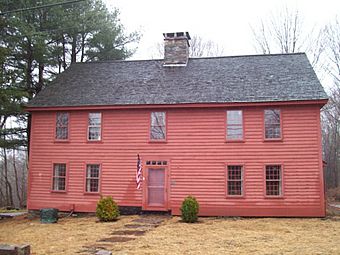Timothy Lester Farmstead facts for kids
Quick facts for kids |
|
|
Timothy Lester Farmstead
|
|
 |
|
| Location | Junction of Crary, Browning and Terry Roads, Griswold, Connecticut |
|---|---|
| Area | 43 acres (17 ha) |
| Built | 1741 |
| Architectural style | Colonial |
| NRHP reference No. | 98001441 |
| Added to NRHP | December 4, 1998 |
The Timothy Lester Farmstead, also known as the Garrison House, is a very old farm in Griswold, Connecticut. It's like stepping back in time to the 1700s! This special place has a farmhouse built around 1741 and other farm buildings from the 18th and 20th centuries. It sits on about 43 acres of land. Because it's so important to history, it was added to the National Register of Historic Places on December 4, 1998.
Contents
Exploring the Timothy Lester Farm
The Timothy Lester Farm is in a quiet countryside area of southern Griswold. Even today, you can see old stone walls around the 43 acres. These walls show where the farm used to be even bigger. The farm buildings are the only structures you'll see in this area. The land around them is slowly turning back into forests.
The Main House and Its Features
The most important building on the farm is the main house. It is a two-and-a-half-story house made of wood. It has five sections across the front and a large chimney in the middle. The house was built in different stages, starting around 1741. It also has a two-story section that extends out the back.
Inside the house, the kitchen is very interesting. It has an unusually large fireplace. This fireplace even has two special ovens called "beehive ovens." These ovens were used for baking bread and other foods a long time ago.
Other Farm Buildings
Next to the main house, you can find a small wellhouse. This building is very old and was used to protect the farm's water well. There is also a barn from the 1700s nearby.
Across Crary Road from the house, there's another barnyard. This area has a barn built in the 1800s. It also includes several other smaller buildings that were used for different farm activities.
A Look Back in Time: The Lester Family
The farm started to be developed for farming around 1741. This was the year Mehitable Belcher married Timothy Lester. The land itself had been bought from Mohegan Native Americans in the 1600s. Moses Belcher, Mehitable's relative, got the land around 1720.
The Lester family was very important in the local community. This house was used as a "garrison" during the American Revolutionary War. A garrison was a place where soldiers could stay and train. The Lester children were all involved in local politics. They signed papers asking for Griswold to become its own town, separate from Preston. This separation happened in 1815.
The Lester family sold the farm in 1857. However, the property continued to be used for farming for many more years. It remained an active farm until the middle of the 1900s.
Images for kids





